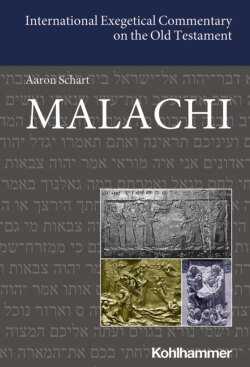Читать книгу Malachi - Aaron Schart - Страница 18
На сайте Литреса книга снята с продажи.
Completion of Thematic Lines
ОглавлениеCriticism of the cult Being in the final position in the Book of the Twelve, the Malachi document provides concluding treatments to certain themes already dealt with in the writings that precede it and takes the opportunity to stress some especially important points once again. Thus, for example, Mal 1:6–2:9 presents the most extended cult-critical passage in the Book of the Twelve. There is reference to the criticism of the cult in Hosea, Joel, Amos, Micah, and Zephaniah (though without direct quotations), but here we find a more pointed emphasis: what is crucial is not so much the moral quality of those who sacrifice; far more important is the acknowledgment of Yhwh’s honor and the significance of Yhwh’s name among the nations. The lack thereof is attributed primarily to the deficient quality of the gifts.
Nations The Malachi document also links to the ambivalent view of the nations in the Book of the Twelve Prophets. Unique here is the positive statement that, among the nations, pure gifts are brought to Yhwh, and that Yhwh’s greatness is reverenced there (Mal 1:11, 14b). However, the negative side appears in the saying about Edom (Mal 1:2–5): the nations’ aggression against Israel. The critique of Edom can be presented so briefly here because it is preceded by the prophecies against Edom in the Book of the Twelve (Joel 4:19; Amos 1:11–12; 9:12; Obad 1–21). The punishment of Edom was announced in the preexilic period; the Malachi document presumes and even intensifies it.
Grace formula The so-called grace formula (German: Gnadenformel, Exod 34:6–7) is quoted repeatedly in the Book of the Twelve Prophets to describe how God’s nature includes both abundant mercy and judgment: Joel 2:13; Jonah 4:2; Mic 7:18–20; Nah 1:2b–3a. In Mal 1:9a, a secondary addition, we read the phrase “soften Yhwh’s face,”29 following Zech 7:2; 8:21, 22. This may be an allusion to the grace formula.30 This network is extremely important for understanding the Book of the Twelve as a whole: the several ways in which God has acted toward Israel and the nations at different times are all embodied in the divine nature insofar as they express the intensely complex essence of God.
Repentance/return Repentance and return to Yhwh plays a major role throughout the Book of the Twelve. The book of Hosea ends with an appeal to return (Hos 14:2–5) that is taken up by Joel (Joel 2:12–14). But because neither Israel nor Judah and Jerusalem responds to the appeal, Yhwh punishes them. Yhwh then grants restoration under Persian rule because Israel, in response to the appeal in Zech 1:3, does repent (Zech 1:6; cf. Hag 1:12). Moreover, Yhwh is said to announce that he, in turn, is returning to Zion (Zech 8:3; cf. 8:11, 15). Still, this repentance seems fragile, for in Mal 3:7 the appeal of Zech 1:3 has to be renewed. The remaining verses of the Malachi document speak of neither Israel’s return nor that of Yhwh, so that the Book of the Twelve remains open-ended. This literary technique indirectly assigns to the readers the role of accepting the book’s invitation. According to the author Yhwh waits with real longing to be able to respond to Israel’s return and to pour forth blessing.
